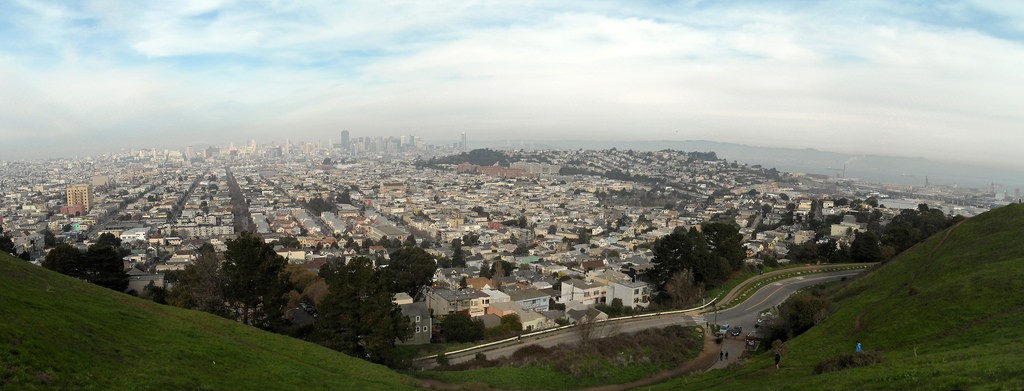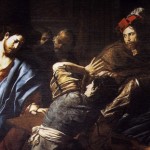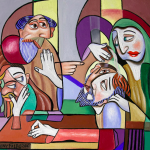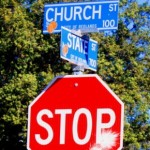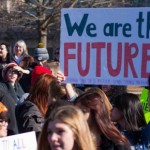Every Wednesday I gather with a small group of guys for what I affectionately refer to as a “non-praying prayer group.” For the past six or eight months we have done our talking while we walking around Bernal Hill. It’s a beautiful loop with sweeping views of the Bay and the City. On a clear day you can see both the Bay Bridge and the Golden Gate Bridge.
And there on the right, as we come around the last bend toward the parking lot, is a makeshift memorial. Lovingly maintained for two years.
It is the memorial for Alex Nieto. Shot at at this park where everyone walks their dog. Shot in this park where I walk without a second thought to my safety. Shot in this park where he had come to eat his chips.
Shot dead in this park the 14 police bullets that hit him out of the 50+ that were discharged. Shot dead within two minutes of the police arriving on the scene.
Memorial and Martyrdom
Yesterday was the second anniversary of Nieto’s murder. I was clued into the date by a stunning piece of journalism in the Guardian by Rebecca Solnit.
It was there that I learned that in an earlier day (before my time) Alex Nieto worked at the same community center where my kids now go for their after school program.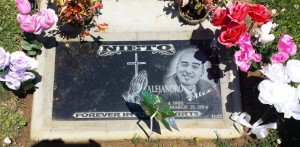
It was there that I saw how xenophobia is more than an annoyance chipping away at the love that I know should be the posture of my own heart. In the hands of the wrong series of the empowered and the privileged, xenophobia is a force of death. In this case, the “stranger” who was a cause of fear was, in fact, the native. Strange only to those who were fresh off the boat to Silicon Valley.
Those who are striving to honor Alex Nieto’s memory aren’t simply seeking justice. The cry of the people is “Justice and Love for Alex.” Last night I saw that mingled hope at the memorial service marking the two-year anniversary of Alex’s death.
Justice and love.
There was a power in that room. (That room where, for the past two summers, I in my white privilege have dropped off my kids each day for four weeks to learn Latino culture and art and dance.)
It was a power that I experienced more palpably precisely because this is holy week. It was the power of a people in the wake of a martyr’s death.
It was the power of the powerless who know–with an unreasonable and yet unquenchable passion–that truth and justice are forced more powerful than the systems whose only design is to protect its own mechanisms.
It is an emotional power, to be sure. But also a spiritual power. And, even more, it is a social power. It’s the power of a people who will see the world transformed—not because they want a larger slice of the American Dream, not because they have a new technology to sell, but because they are demanding that we, the people, make good on our common covenant of life together.
The Way of the Cross
In all of our reflecting on and theologizing about the cross many of us (of European descent) have managed to miss the most important claim staked out by Jesus’s death: that God’s way of enacting radical, world-chaning transformation utterly rejects the power systems of this world. God’s way of reaching down and turning the world upside down touches the powerless and empty so that when the change breaks into full flower we will know that the power is from God and not ourselves.
The cross is nothing if it is not a critique of the world’s power.
That power was borne in the nails and whips and spears and swords of first-century Rome. It is borne in the guns and cuffs and sticks and drones of twenty-first century America.
It’s a power that looks invincible.
Until true power is put on display by a woman who refuses to leave her seat on the bus.
Until true power is put on display in a man whose spirit will not be broken in a work camp.
Until true power is put on display by someone who puts up his hands in surrender and the crowds take up his cause: Hands up! Don’t shoot!
Until true power is put on display by words of grace and pardon. “Father forgive them.”
When I stood in that room last night, listening to the love and justice struggling to find its traction, struggling so that it might surge into the city that has nurtured so many Latin@s before evicting them and pricing them out, I felt that power.
Lent is the season when we embrace the powerlessness and emptiness of fasting. It’s the time when we willingly lay aside the power and privilege we have to eat what we want, drink what we want, do what we want–maybe, just maybe, to catch a glimpse of the God who reaches down to make Herself known as the provider and strengthener and the powerful just through those situations of lack.
Lent is the season when we open ourselves up to a little more of the possibility of walking the way of the cross.
Holy Week is the focus of this time of self-denial. It’s the time when we see stubborn refusal to seize power by the means of violence and coercion.
It’s an act of faith and hope. It’s an act of trust that what we cannot see, and what the hidden path that takes us there, will arise from the power of God’s own hand and the way of self-sacrificial love.
In the wake of Alex Nieto’s death, new life is springing up from the ground.
New life for white San Franciscans who have their eyes opened to the ways that our humanity has been degraded by the treatment of our fellow divine image-bearers. New life for brown and black San Franciscans who are coming together, in fresh ways, to claim life for themselves in the way of justice and love. New life for a next generation that, I dare hope, will know more of freedom and justice because of this love.
This is the way of the cross. This is the hand of God that works itself out in true fasting:
Is not this the fast that I choose: to loose the bonds of injustice, to undo the thongs of the yoke, to let the oppressed go free, and to break every yoke? Is it not to share your bread with the hungry, and bring the homeless poor into your house; when you see the naked, to cover them, and not to hide yourself from your own kin? Then your light shall break forth like the dawn, and your healing shall spring up quickly. (Isa. 58:1 NRS)
This is our fast. Lenten or otherwise. This is the way of the cross. Our calling in Holy Week and always.
This is the way of those who honor the pacifist Buddhist who was shot and killed on March 21, 2014, in Bernal Heights Park.
His death is not in vain—may our healing spring up quickly.
Photo: Bernal Heights Park by Daniel Ramirez| flickr | CC 2.0

